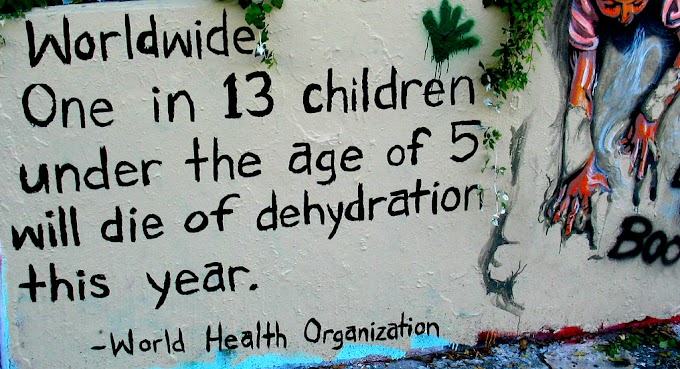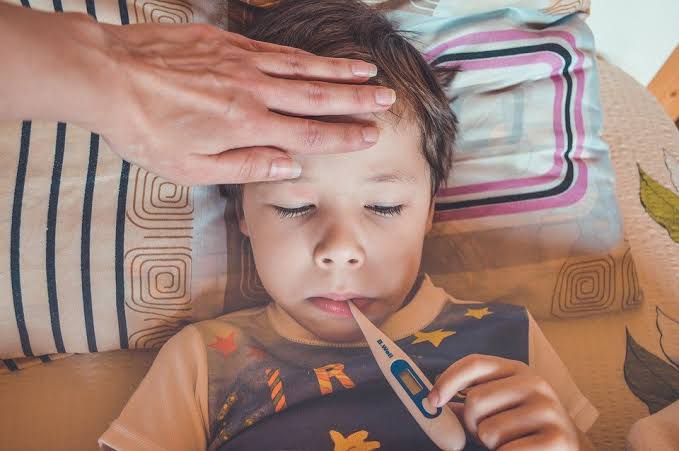Dehydration
Dehydration is a condition occuring when body loses excess fluids than intake.
Cause of dehydration-
Dehydration can occur due to -
- Diarrhoea
- Recurrent bouts of vomiting
- Heat stroke
- Burns
- Excessive physical workout
Symptoms of dehydration-
In mild dehydration , following symptoms are menifested-
- Incresed thirst
- Decrease urine output
- Dark colored urine than usual
- Dry mouth
- Headache
- Dizziness when standing due to orthostatic hypotension.
In moderate to severe dehydration following symptoms are generally menifested-
- Sunken eyes
- Negligible urine output
- Convulsions
- Sunken fontanel in infants
- Fainting
Assessment of dehydration :-
Dehydration is categorised as below-
- No dehydration
- Some dehydration
- Severe dehydration
No dehydration-
No dehydration is a state where the child is having only loose stools without any other complaint.It can be called as mild dehydration also.
Some dehydration-
It is when child is having loose stools , thirst, irritable, and sunken eyes.It is moderate dehydration
Severe dehydration-
When child is having symptoms like loose stools, lethargy, sunken eyes, inability to drink , and when skin is pinched it take more time than usual to go at its original position.
Complications of dehydration:-
Long lasting dehydration can result in -
- Malnutrition
- Shock
- Death
Treatment of dehydration:-
Dehydration is treated by rehydration therapy.
In majority of cases of acute diarrhoea, rehydration is only needed
Rehydration can be done orally or intravenously.
It is one of the best and responsive measure.
ORS drink is prepared in following way -
Content
NaCl 2.6 g
KCl 1.5 g
Glucose 13.5 g
Trisodium citrate 2.9 g
Water 1 Litre
Concentration-
Na⁺ 75 mM
K⁺ 20 mM
Cl¯ 65 mM
Citrate 10mM
Glucose 75 mM
Patients are advised to drink ORS at half to one hour interval.
✓For children ≥ 2 years at leat 1/2 to full 1 glass of the ORS drink to be given after each watery stool
Ingredients requited are-
Preparation-
Take 1 Litre of clean water ( boiled and than cooled to normal ) in a bowel and add salt and sugar in the specified amount.
Stir the mixture till the salt and sugar dissolves.
If possible add some amount of mashed banana to provide some potasium.
ORS is not meant to stop diarrhoea, rather it stores and maintain hydration, electrolyte, & pH balance until diarrhoea ceases.
It is also needed when the patient is unable to take enough oral fluids due to weakness, continous vomiting bouts.
The recommended compositions of IV fluids is :-
NaCl 85 mM = 5 g
KCl 13 mM = 1 g
NaHCO₃ 48 mM = 4 g
The above specified amounts to be used in 1 Litre of water or 5% Glucose solution.
It is the initial treatment of choice in severe dehydration.
Rehydration
It is a prectice of restoration of salt and water depletion during dehydration caused mostly due to diarrhoea and vomiting.In majority of cases of acute diarrhoea, rehydration is only needed
Rehydration can be done orally or intravenously.
Oral rehydration:-
It is a simple, less painful, non- invasive, less expensive and more convenient method of rehydration so it is the treatment of choice in mild dehydration.It is one of the best and responsive measure.
When to give oral rehydration-
If the fluid loss is mild (5-7% body weight), oral rehydration therapy is the most effective measure.ORS( oral rehydration salts):-
It is a combination of dry salts and sugar that is mixed with clean water.How is ORS drink prepared:-
ORS drink is prepared in following way -
- Put the ORS powder in a clean container.
- Now add the specified volume of water( boiled and than cooled)
- Stir well and let the parient drink under hygienic conditions
What is the composition of New Formula WHO - ORS :-
The WHO & UNICEF have recommended replacement of standard ( 310 mOsm/L) ORS Formula by the new( 245 mOsm/L) formula.Content
NaCl 2.6 g
KCl 1.5 g
Glucose 13.5 g
Trisodium citrate 2.9 g
Water 1 Litre
Concentration-
Na⁺ 75 mM
K⁺ 20 mM
Cl¯ 65 mM
Citrate 10mM
Glucose 75 mM
When ORS should be used?
When a child has 3 of more loose stools in a day.Patients are advised to drink ORS at half to one hour interval.
How much ORS drink to be given?
✓For children less than 2 years at least 1/4 to 1/2 of a glass ( 250ml) the ORS drink should be given after each watery stool✓For children ≥ 2 years at leat 1/2 to full 1 glass of the ORS drink to be given after each watery stool
Home made ORS solution:-
If ORS is not available make it yourself.Ingredients requited are-
- Half (1/2) teaspoon of salt
- Six (6) teaspoon of sugar
- One Litre of water ( boiled and than cooled)
Preparation-
Take 1 Litre of clean water ( boiled and than cooled to normal ) in a bowel and add salt and sugar in the specified amount.
Stir the mixture till the salt and sugar dissolves.
If possible add some amount of mashed banana to provide some potasium.
ORS is not meant to stop diarrhoea, rather it stores and maintain hydration, electrolyte, & pH balance until diarrhoea ceases.
Other uses of ORS:-
- Heat stroke
- Burns
- Post traumatic and post surgical maintenance of hydration and nutrition.
IV (intravenous) rehydration:-
It is done when there is severe fluid loss (>10% body weight), or if patient is losing> 10 ml/kg/ hrIt is also needed when the patient is unable to take enough oral fluids due to weakness, continous vomiting bouts.
The recommended compositions of IV fluids is :-
NaCl 85 mM = 5 g
KCl 13 mM = 1 g
NaHCO₃ 48 mM = 4 g
The above specified amounts to be used in 1 Litre of water or 5% Glucose solution.
It is the initial treatment of choice in severe dehydration.






0 Comments
Please do not enter any spam link in the comment box.
Emoji